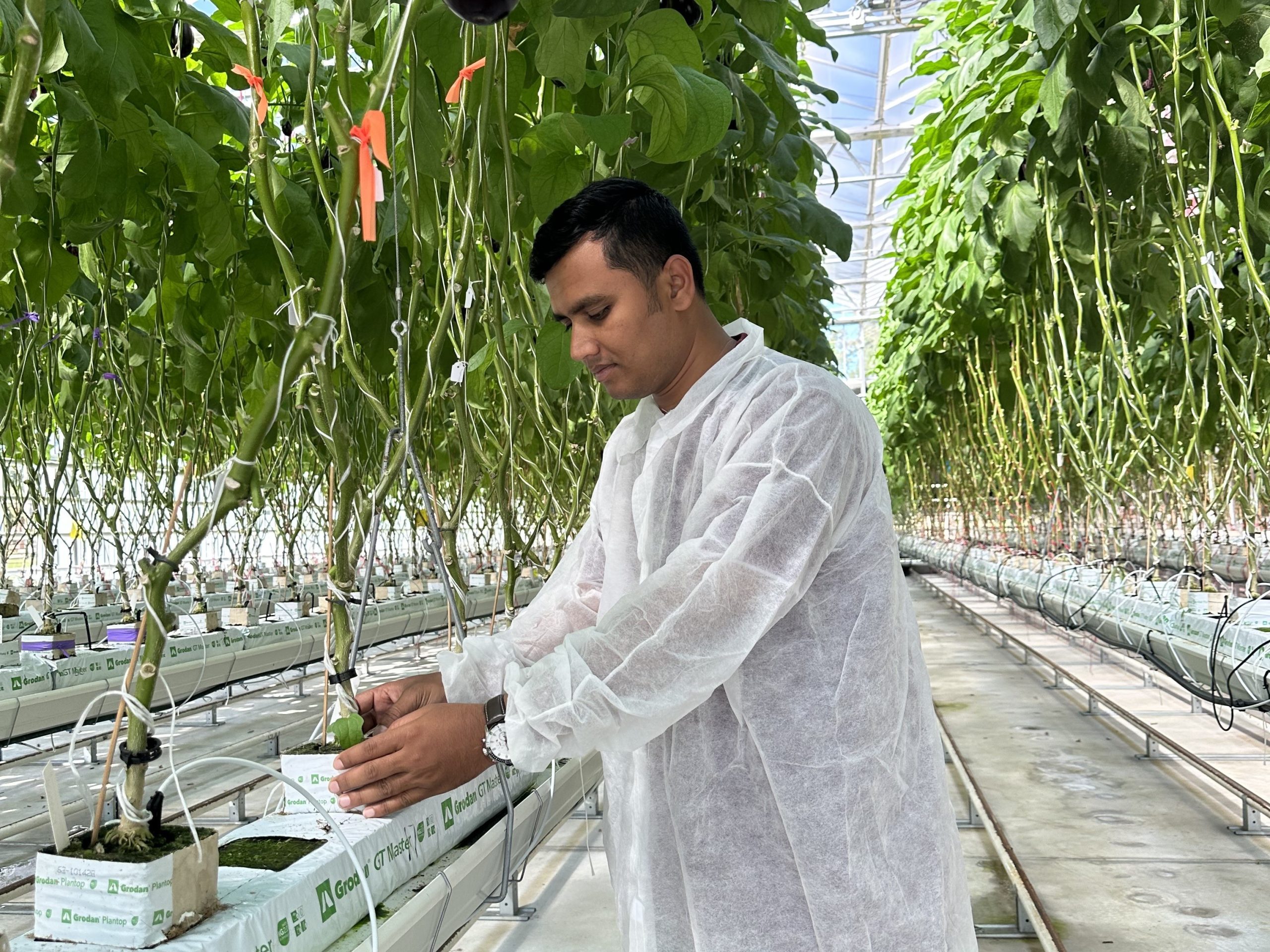Several Future Food Systems-backed PhD students and project leads have had research papers published this year, including Dr Ruey Leng Loo, Odgerel Bumandalai, Mazadul Islam and Terry Lin.
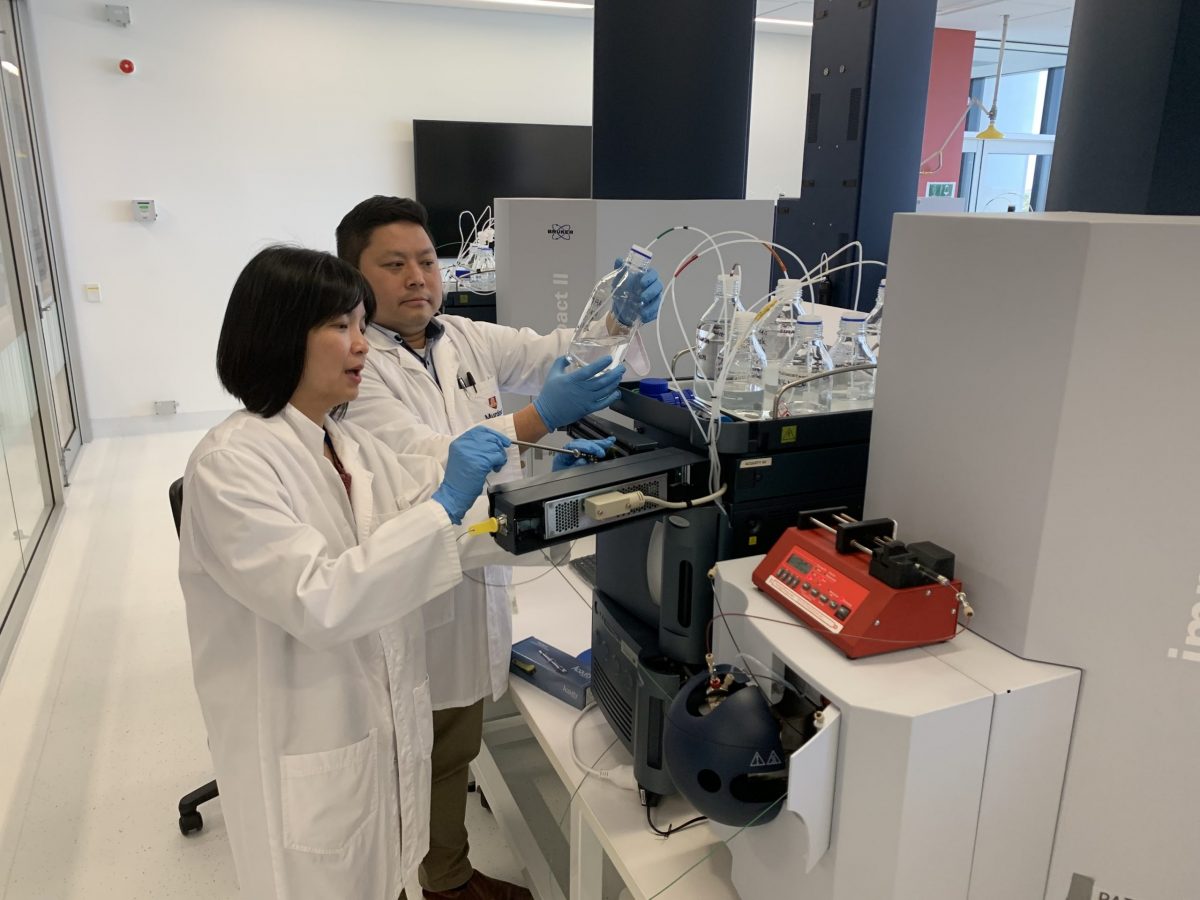
Dr Ruey Leng Loo in the lab with Dr Sung Tong Chin, a mass spectrometry specialist working, at the ANPC. Credit: Andrea Orlowsky
At the world-leading Australian National Phenome Centre (ANPC) on Murdoch University campus, Dr Ruey Leng Loo has been conducting sophisticated molecular-level analyses of health-benefiting long-chain inulin in WA-grown globe artichokes and other vegetables, including elephant garlic and Jerusalem artichokes, as part of the FFS-backed ‘Artichokes’ project. The work of Dr Loo and her research team, which includes several students and post-grads, has been published in the May 2024 issue of academic journal Food Research International.
The multi-author paper detailed the research team’s efforts to quantify long-chain inulin in these various vegetables by using MALDI-MRMS analyses, which ‘can rapidly and reliably quantify each DP of inulin in plants’.
Read and download the paper here.
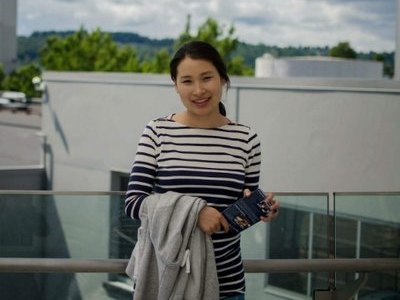
Odgerel Bumandalai, an FFS-supported PhD student working on new ways to combat contamination in fresh spirulina at Murdoch University. Image courtesy of Odgerel Bumandalai, Murdoch University
Meanwhile, FFS-backed Murdoch University PhD student Odgerel Bumandalai has been investigating new ways to improve the safety and shelf life of fresh spirulina as a potent health supplement. Ms Bumandalai’s research to date has been published as a paper, co-authored with Murdoch University Professors Kirsty Bayliss and Navid Moheimani, in the March 2024 issue of Algal Research.
Spirulina is a form of blue-green algae with many purported health benefits. While fresh spirulina delivers a more nutrient-rich punch, most spirulina products are sold in dried form, as fresh spirulina has a comparatively short shelf life and is prone to contamination. Ms Bumandalai’s research reviewed potentially effective decontamination techniques – ‘crucial to ensure product safety without compromising nutritional value and sensory attributes’, the paper states. Ms Bumandalia, reviewed several methods that could be used to process and de-contaminate fresh spirulina, including one particularly promising method: the application of cold plasma.
Read and download the paper here.
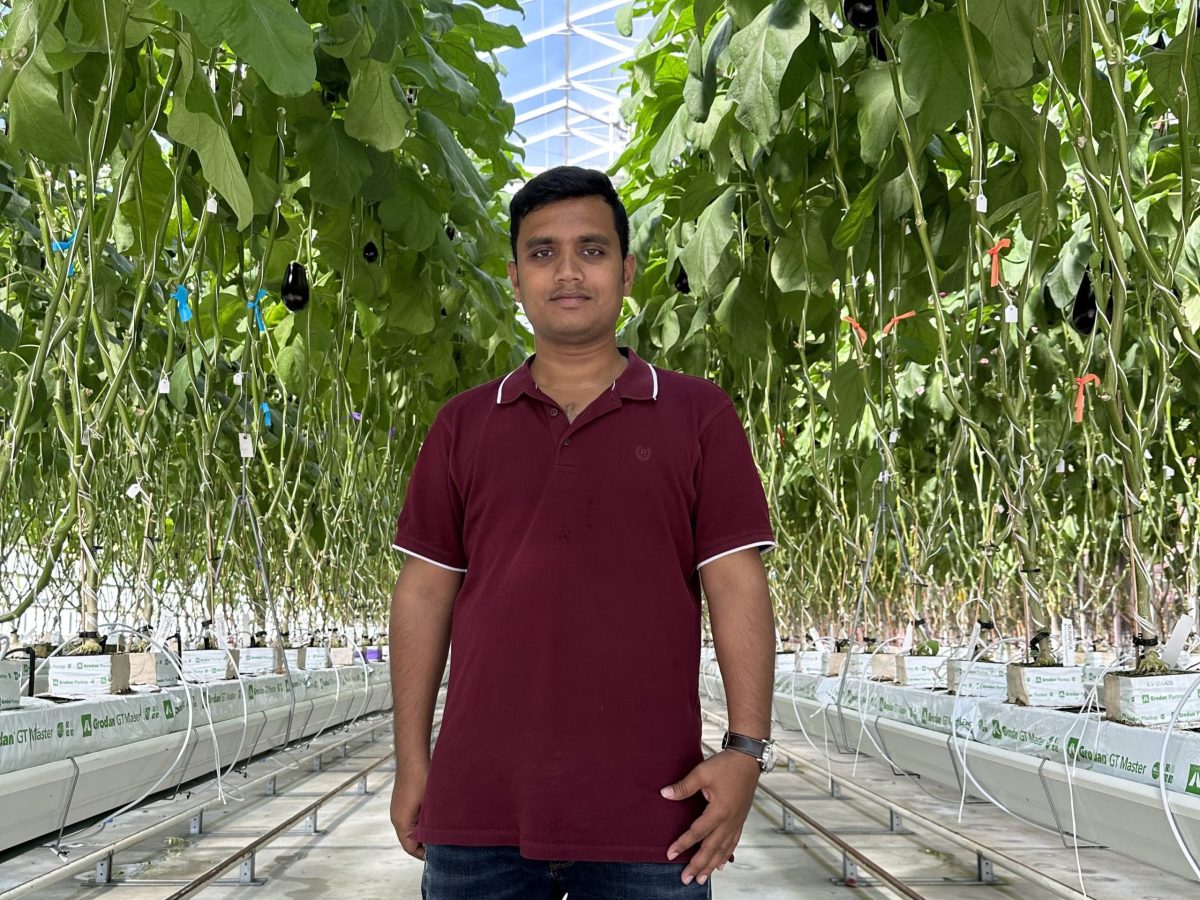
Mazadul Islam in the experimental glasshouse at Western Sydney University’s Hawkesbury Institute for the Environment. Image courtesy of Md Mazadul Islam, WSU
At Western Sydney University’s Hawkesbury Institute for the Environment (HIE), PhD student Mazadul Islam has been working with Professor Zhonghua Chen, a highly cited researcher and an expert in plant physiology, plant breeding, biophysics and agronomy, to investigate optimal fertigation regimes for vegetable crops grown in high-tech glasshouse facilities in the FFS-backed ‘Sustainable fertigation’ project, a collaboration with Qatar University. A paper in which Mr Mazadul details his research findings to date has been published in Scientia Horticulturae. View and download the paper here.
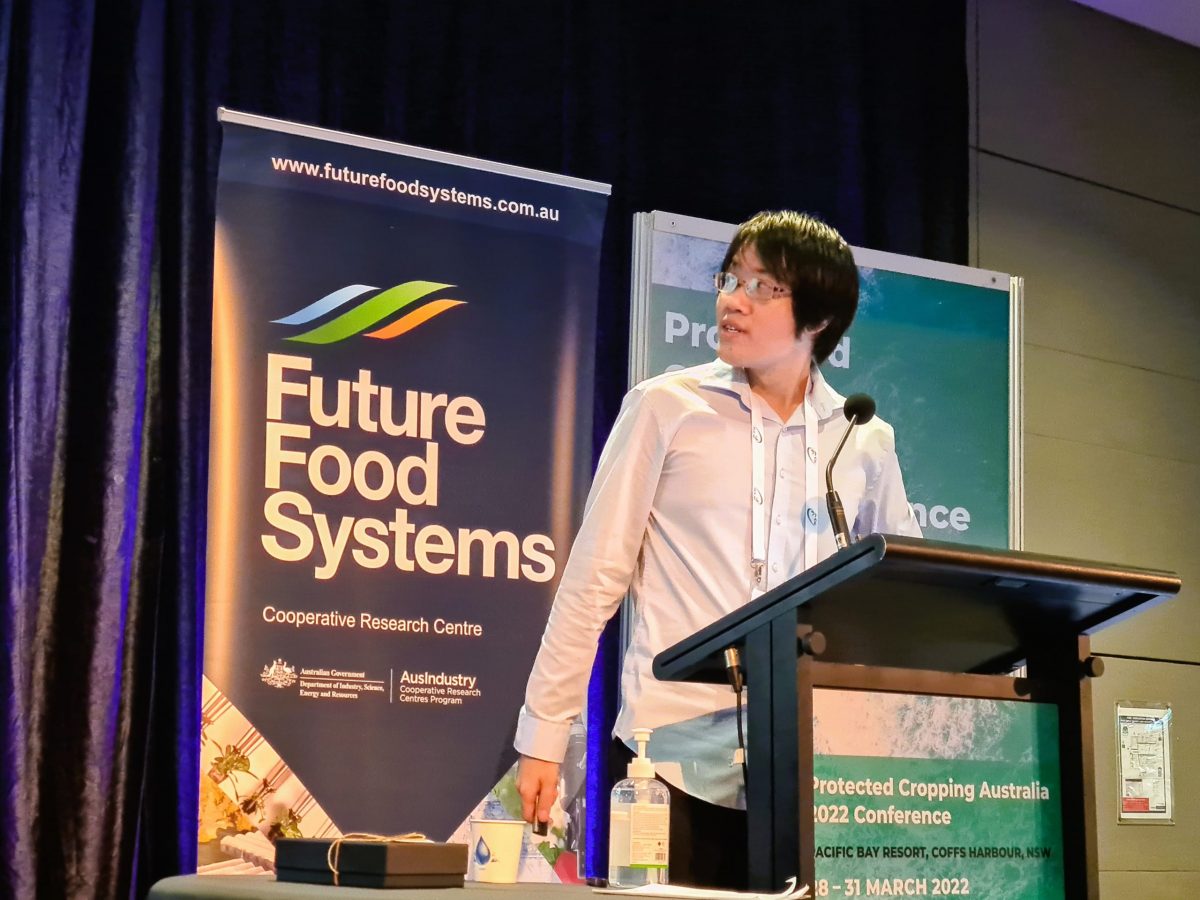
CRC PhD student Terry Lin presenting his work at the Protected Cropping Australia conference in March 2022. Credit: Future Food Systems
And for the past four years, HIE-based doctoral candidate Terry Lin has been researching energy aspects of ‘Smart glass’ in collaboration with CSIRO. He has made comprehensive analysis of energy and nutrient use during crop trials under the prototype SG ULR-80 and LLEAF-Red films to develop energy modelling of various greenhouse-grown crops, including eggplant, capsicum, cucumber and lettuce. Mr Lin is the lead author, with colleagues Chelsea R. Maier, Weiguang Liang fr0m NSW DPI, and WSU’s Norbert Klause, Dr Jing He, Dist.Prof. David Tissue, and Yi-Chen Lan, CSIRO’s Dr Subbu Sethuvenkatraman and Dr Mark Goldsworthy and WSU Professor Zhonghua Chen on a paper titled ‘A light-blocking greenhouse film differentially impacts climate control energy use and capsicum production’, published in the 7 March 2024 issue of Frontiers in Energy Research. Read and download the paper here.
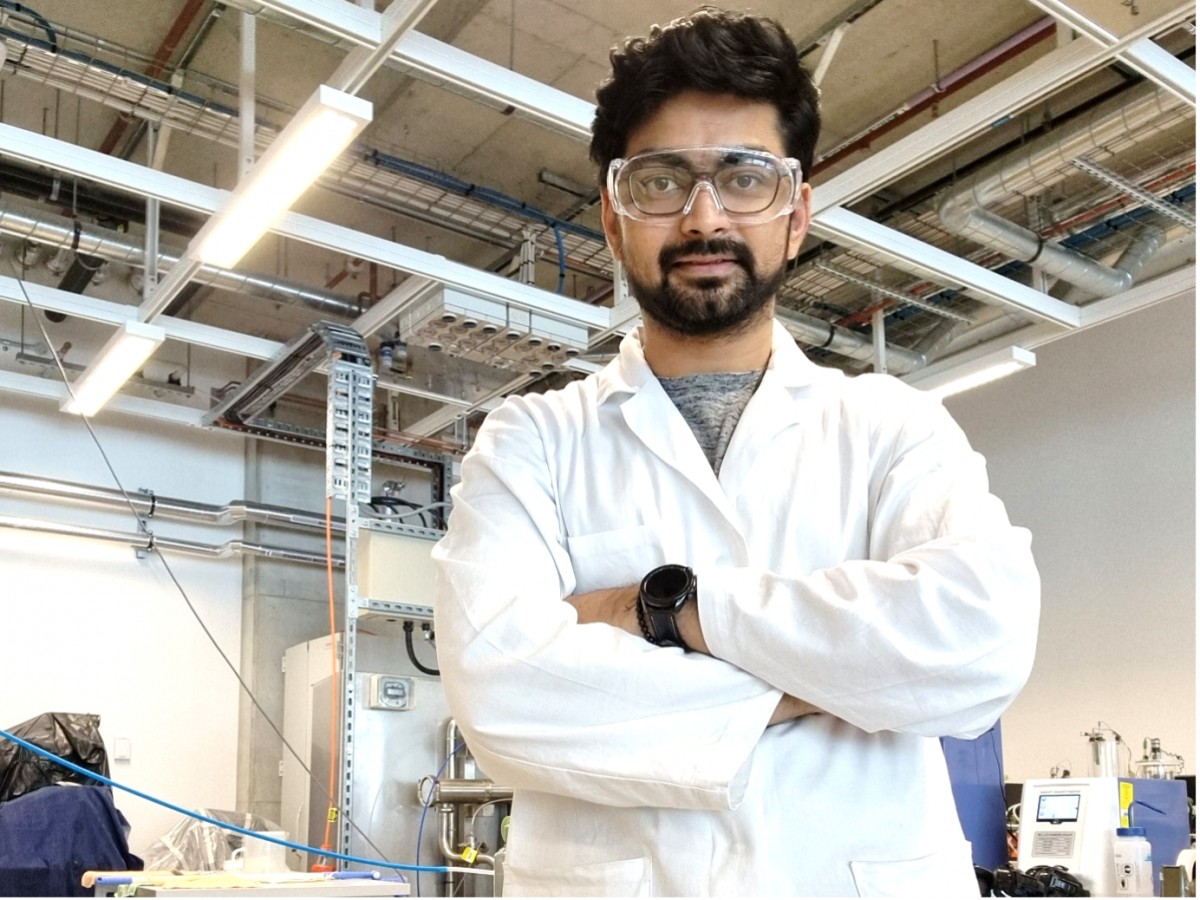
Rishi Ravindra Naik, PhD student. Credit: Courtesy of Rishi Ravindra Naik/UNSW School of Chemical Engineering
FFS-supported PhD students Rishi Naik , from UNSW’s School of Chemical Engineering, and Namal Jayasuriya, from Western Sydney University’s HIE, have also had papers detailing their research published in recent months.
Rishi Naik has been the lead author of several academic papers published over the past three years, elucidating his findings on Maillard reactions in plant-based ingredients such as amaranth. The most recent, published in January 2024 in Food Research International and titled ‘Assessing the effect of Maillard reaction products on the functionality and antioxidant properties of Amaranth-red seaweed blends’, was co-authored with UNSW colleagues Dr Qianyu Ye, Dr Yong Wang, and Naik’s primary supervisor, Prof. Cordelia Selomulya.
In this paper, Mr Naik looked at the potential of plant-based proteins – represented by amaranth in his study – as ingredients for functional food formulation. Currently, the paper’s authors note, the efficacy of such proteins ‘is hindered by inherent limitations in solubility, emulsification, and antioxidant traits’.
‘The Maillard reaction, a complex chemical-process resulting in a diverse array of products … can employ variable effects on these specific attributes,’ the paper’s Abstract states. ‘To elucidate the influence of this reaction … on the aforementioned properties, we used a complex blend of dehydrated seaweed Gracilaria and amaranth protein to create a conjugate-MRP blend. Our investigations revealed that the resultant incorporation enhanced solubility, emulsification, and antioxidant properties, while the intermediates formed did not progress to advanced glycation stages.’
View and download the complete paper here.
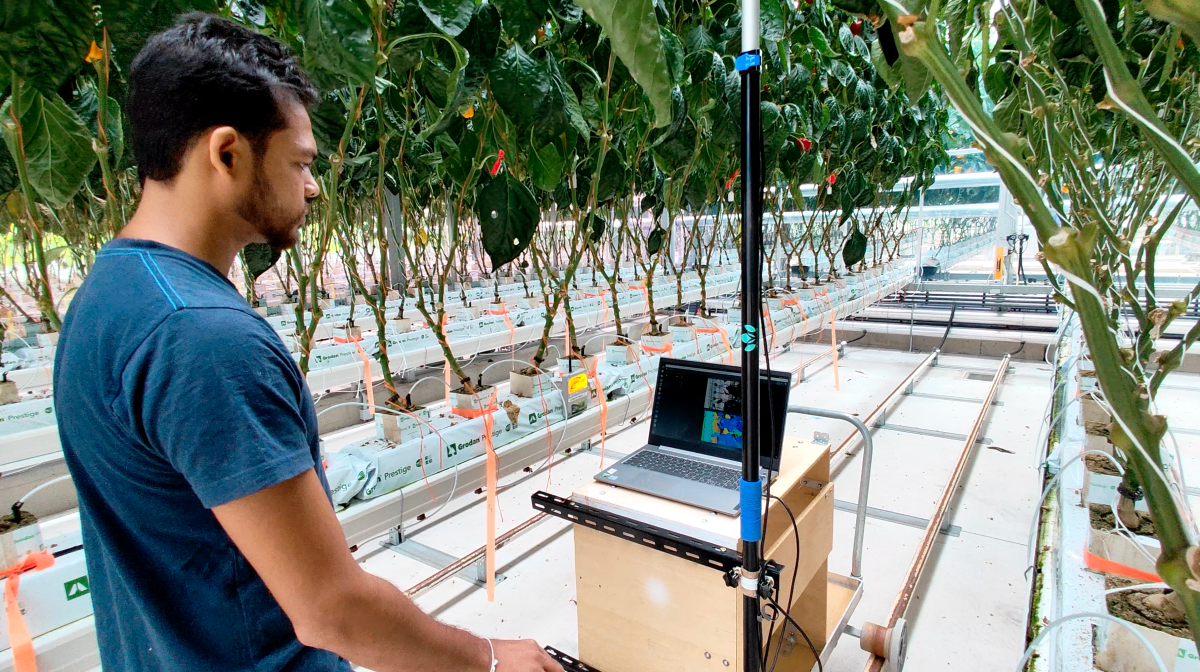
Namal Jayasuriya, testing his automated imaging platform for estimating plant height on trial capsicum crop in the NVPCC glasshouse at Western Sydney University’s Hawkesbury Institute for the Environment. Credit: Western Sydney University
Namal Jayasuriya was the lead author on a paper published in the February 2024 issue of Computers and Electronics in Agriculture. The paper, co-authored with colleagues Yi WSU Associate Professor Yi Guo, UNSW Sydney Professor Wen Hu and HIE’s Professor Oula Ghannoum and titled ‘Machine vision based plant height estimation for protected crop facilities’, details Mr Jayasuriya’s doctoral research developing a low-cost automated imaging platform for estimating plant height in high-tech glasshouse facilities.
In this paper, explains lead author Jayasuriya, ‘we demonstrate machine vision and AI based plant height estimation for horticultural crops, targeting commercial scale automated crop monitoring, […] designing a simple and affordable imaging platform to measure vertically supported taller plants’.
Read more about the paper here. Download a pdf of the paper here.
Lead image: FFS-backed PhD student Mazadul Islam in the experimental glasshouse at Western Sydney University’s Hawkesbury Institute for the Environment. Image courtesy of Md Mazadul Islam, WSU


